Seminars with external speakers will be once or twice a month. On other weeks, seminars are held by the internal AMGC researchers, students, and guests.
For more information or to propose speakers, please contact Axel Cerón González, Charlotte Van Riet, Oriana Chiappa, Vendula Smolikova or Maxwell Thiemens who are in charge of the seminar organisation.
PROGRAM 2025-2026
THURSDAY 19 February 2026, 4 PM CET, Room 10G

Dries Vergouwen
AMGC PhD Candidate
Revealing the Senne: a hidden landmark in the historical center of Brussels
The Senne has been a key driver of Brussels’ environmental and urban history, functioning as a dynamic structuring element in the city’s changing landscape. Over time, the river supplied water and food resources, supported transport and trade, and increasingly served as an outlet for waste. Its banks hosted diverse infrastructure, including mills, breweries, fishponds, fortifications, and harbour installations. As urbanisation intensified, the Senne and its tributaries were progressively reshaped through both natural processes and human intervention, fundamentally transforming the river valley. In this presentation, Dries will share the project’s first results and discuss the methods used to integrate archaeological, historical, geological, and environmental evidence, from GIS analysis (QGIS and ArcGIS) to 3D modelling and geological reconstruction using RockWorks.
Dries completed both his bachelor’s and master’s degrees in Art Sciences and Archaeology at the Vrije Universiteit Brussel (VUB). Since 2023, he has been working on RETS: Revealing the Senne, an Innoviris-funded applied PhD project carried out in partnership between VUB and urban.brussels (the governmental administration for the Brussels-Capital Region). Under the supervision of Ralf Vandam, Yannick Devos, Ann Degraeve, and Marc Meganck, his research examines the Holocene evolution of the Senne River within Brussels’ historic centre, tracing its development up to the 19th century.
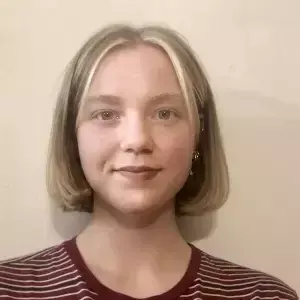
Lucrezia Buoli
AMGC Assistant Researcher
(Peri-) Urban Dark Earth in Brussels
Although archaeology and the natural sciences have long been closely connected, the integration of environmental studies into urban archaeology in Europe developed mainly at the end of the twentieth century. Geoarchaeology subsequently became a key approach for investigating stratigraphy and depositional processes, with increasing attention to sediments embedding archaeological artefacts. This seminar focuses on Dark Earths—thick and homogeneous stratigraphic units commonly found in Roman and post-Roman contexts that result from the interaction between human activity and natural depositional processes. An overview of Dark Earths and the principal geoarchaeological methods used to study them will be presented, with particular attention to the Dark Earths of Brussels. A case study will be presented to show that Dark Earths, contrary to what was previously thought, also occur outside urban environments.
Lucrezia Buoli earned her Bachelor’s degree in Anthropology, Religions and Eastern Cultures at the University of Bologna, followed by a Master’s in Archaeological Sciences at the University of Padua, where she specialized in geoarchaeology and micromorphology. During her studies, she gained field mexperience at a Bronze Age site in northern Italy and through evaluative coring sampling. She also participated in the Erasmus program at the University of Tübingen, focusing on organic materials in archaeological contexts, sedimentary processes, and archaeobotanical and anthracological remains. Back in Padua, she completed a Master’s thesis on the geoarchaeological study of a Neolithic soil in Italy, using micromorphological analysis, granulometry, and radiocarbon dating to reconstruct site formation processes. In August 2025, she began working as an Assistant Researcher in Micromorphology at Vrije Universiteit Brussel under the supervision of Prof. Yannick Devos, analysing and describing thin sections from Brussels and its surroundings, with a particular focus on Dark Earth.

Meihui Li
AMGC PhD Candidate
Open Spaces Are Not Empty!
Urban archaeology has long privileged buildings and standing structures, often leaving open spaces—vacant lots, marginal grounds, and marketplaces—understudied and undervalued. Yet these “in-between” areas are integral to urban cultural heritage and to how towns were organised, used, and maintained over time. This talk argues that urban soils, especially Urban Dark Earth (UDE), provide a powerful archive for recovering the histories of such spaces when architecture is absent or fragmentary. Using soil micromorphology as a high-resolution method, I present a comparative study of two open-space types: an urban wasteland and a marketplace context. By tracing micro-stratification, anthropogenic inputs, reworking signatures, and soil-formation overprints, the comparison reveals distinct depositional pathways and patterns of land use and management. The results show why micromorphology is essential for moving urban archaeology beyond the macro-scale and for integrating open spaces into urban narratives.
Meihui Li has a multidisciplinary background in history, anthropology and archaeological science, with master’s degrees from the Chinese University of Hong Kong, the University of Évora (Portugal), Sapienza University of Rome (Italy), and Aristotle University of Thessaloniki (Greece). She has worked as a research assistant at Nanjing University and as an academic editor at the Institute of Archaeology, Chinese Academy of Social Sciences. Her professional experience also includes museum practices as a curator and educator at the Sichuan Provincial Museum (a national first-grade museum). She also contributed to major national initiatives, including the Archaeological Database of China. Her earlier research has resulted in several Chinese-language publications on the history of Chinese archaeology, the Maritime Silk Road, and the study of cultural relics and decorative motifs. Currently, she is a PhD candidate working on the FWO-funded WEAVE project, mainly under the supervision of Prof. Yannick Devos. Her research focuses on Urban Dark Earths in European towns and investigates their formation processes through multi-proxy micromorphology. By linking micro-stratigraphic evidence to site-formation models, she aims to improve high-resolution interpretations of urban deposits and reconstruct medieval urban land use and spatial organisation. Her first case study examines open spaces in the historic centre of Oudenaarde (Belgium), comparing riverside marginal zones with marketplace to explore diverse depositional trajectories and patterns of use over time.
PREVIOUS SEMINARS
THURSDAY 9 October 2025, 4 PM CET, Room 10G
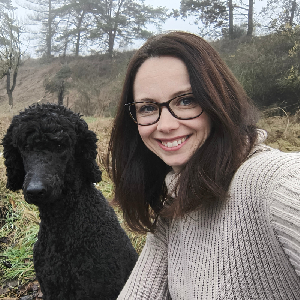
Dr. Katharina Ameli
Lecturer at the Institue for Sociology and coordinator at the Interdisciplinary Center for Animal Welfare Research at Justus-Liebig-Universität Giessen
Multispecies ethnography in animal-assisted services
Following professor Tim Ingold’s thought-provoking seminar in March, our research group continues the conversation on more-than-human approaches with a focus on multispecies ethnography. Dr. Katharina Ameli will share with us insights from her work on animal-assisted services, inviting us to consider how non-human beings actively shape social worlds.
Multispecies ethnography offers an innovative methodological framework for researching animal-assisted services by understanding human-animal interactions not only as functional relationships, but as reciprocal, socially and materially embedded practices. Instead of viewing animals as objects of human care, this approach places their agency, perceptual worlds, and individual contributions at the center of analysis. The talk will address the inclusion of animals within multispecies ethnography in animal-assisted services.
THURSDAY 06 November 2025
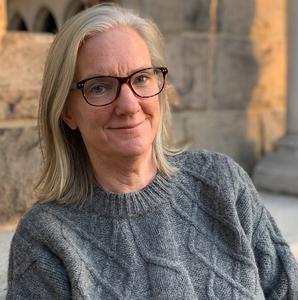
Prof. Alison Beach
Professor in Medieval History at University of St. Andrews
Medieval Work as Embodied Experience: The Case of ELS215 from Bone to Biomolecule
Alison Beach is a professor in Medieval history at the School of History, University of St. Andrews, UK. In this seminar, Alison will present a historical osteobiography of a female individual (burial designation ELS215) buried in the medieval monastic cemetery of Elstow Abbey (Bedfordshire, UK) in the twelfth or thirteenth century. Combining burial topography, osteological analysis, dental calculus analysis, proteomics, and stable isotope analysis, I will venture an integrated story of a medieval woman who both performed manual work within her community and experienced extreme physical impairment from advanced tuberculosis myelitis (Pott’s disease). I will offer evidence of the type of manual work in ELS215 engaged, as well as her diet, oral health, and ingestion of medicinal materials. This case study is part of the AHRC-funded project Word of Mouth: Embodied Stories of Premodern Women at Work. The Word of Mouth project seeks to recover, contextualise, and synthesise women’s stories, providing an unprecedentedly fine-grained picture of women’s work and occupational health in monastic contexts.
THURSDAY 13 November 2025
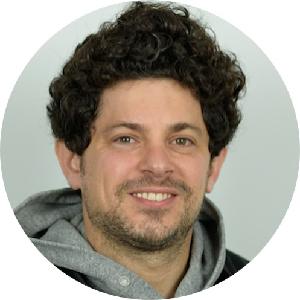
Dr. Jonathan Goldenberg
Postdoctoral researcher at the University of Oslo
SHARKSense: Reading the ocean through the colors of sharks
Pollution is one of the most pervasive threats to biodiversity, yet assessing its ecological impact remains costly and complex. In the SHARKSense project, we explore an unconventional but promising bioindicator: skin darkness. Sharks, as meso-apex predators, accumulate heavy metals from both their environment and the food chain. Intriguingly, melanin - a pigment responsible for dark coloration - can bind and sequester these toxic compounds. Could pollution be driving the evolution of darker-skinned individuals?
SHARKSense investigates this question by integrating computer vision, evolutionary biology, biochemistry, and fieldwork to uncover correlations between melanin deposition, skin darkness, and pollution. By spanning taxa, geography, and time, we aim to determine whether integument color can serve as a reliable, non-invasive proxy for ecosystem health, beginning with a foundational framework that links pigmentation patterns to environmental stressors. This talk will introduce SHARKSense, present early findings, and discuss how pigmentation might offer a scalable tool for ecological monitoring, bridging molecular mechanisms with conservation strategy.
THURSDAY 22 January 2026, 4 PM CET, Room 10G

Prof. Dr. Gabriele Macho
Professor in Bioarchaeology at the Vrije Universiteit Brussel
Introducing PLIODIS: Pliocene Hominin Dispersal to southern Africa - Choice or Chance?
PLIODIS is an ERC Advanced Grant project that addresses a key question in human evolution: did early hominins disperse into temperate southern Africa during the Pliocene through active adaptive choice, or were they passively driven by tectonic and climatic forces? Although hominins evolved in tropical Africa around six million years ago, evidence for their presence in southern Africa by ~3.7 million years ago raises important questions about the timing and nature of early hominin adaptability. PLIODIS applies a multidisciplinary framework integrating palaeoclimatology, geomorphology, paleoecology, functional morphology, biomechanics, (zoo)archaeology, and evolutionary theory to reconstruct environmental dynamics and population processes during the Pliocene. Focusing on key Plio-Pleistocene sites in southern and eastern Africa, the project investigates whether early hominin populations were environmentally constrained, geographically isolated, or already capable of colonizing more variable temperate environments. By doing so, PLIODIS seeks to identify when the adaptive flexibility that later enabled Homo to disperse beyond Africa first emerged, potentially predating the origin of the genus Homo.
Prof. Dr. Gabriele Macho is a biological anthropologist whose research focuses on early hominin evolution, adaptation, and dispersal. Trained at the University of Vienna, she has held research and faculty positions at leading institutions across Australia, South Africa, the United Kingdom, and Spain, including the University of Western Australia, the University of the Witwatersrand, the University of Oxford, and University College London. She is the holder of an ERC Advanced Grant for the project PLIODIS and leads an international, interdisciplinary research team investigating Pliocene hominin dispersal into southern Africa. In September 2025, she joined AMGC, bringing extensive expertise in functional morphology, paleoecology, and evolutionary theory to questions that have shaped paleoanthropological debate for over a century.
THURSDAY 5 February 2026, 4 PM CET, Room 10G
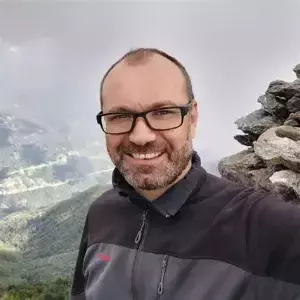
Prof. Dr. Ronny Schönberg
Professor for Isotope Geochemistry at the University of Tübingen
The mode and timing of the appearance of early Earth's atmospheric oxygen
In this talk I will present an overview of important advances made by the international science community and my own research group regarding the oxidation of Earth’s atmosphere-hydrosphere system from the Mesoarchaean to the Paleoproterozoic. This process has not only ultimately influenced and shaped the development of life on our planet, but it also led to Earth’s first low-latitude glaciations in the Paleoproterozoic, some probably being similar in extent to the Sturtian and Marinoan Snowball Earth Events of the Neoproterozoic. The Paleoproterozoic glaciation events eventually led to a rebound with increased marine bio-productivity during the 2.2 Ga Lomagundi Event with proposed atmospheric oxygen levels similar to today. I will discuss the timing and mode of this early atmospheric oxidation and point out problems and questions that so far elude our understanding.
Ronny Schönberg is currently Professor for Isotope Geochemistry at the Department of Geosciences, University of Tübingen, Germany. In his early career he investigated the formation of layered intrusions and their economically important chromium and platinum reefs with Re-Os isotopes and helped to unravel the timing of Earth’s core formation using the short-lived Hf-W isotope systematics. With the introduction of commercially available plasma-source multicollector mass spectrometers to Science in the early 2000s Ronny Schönberg shifted his main research tool to “non-traditional” stable isotopes and up to today uses the combination of major and trace element systematics with transition-metal stable isotopes (e.g. Cr, Fe, Zn, Se, Mo and more) to investigate sources of various mantle reservoirs and melts, processes during crust-mantle interaction and redox-changes in the atmosphere-hydrosphere system throughout Earth’s history.
